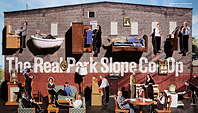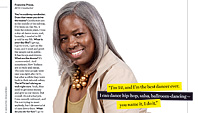
1. There are few political figures as divisive as Nancy Pelosi, so it was no surprise to see Vanessa Grigoriadis’s profile of the Speaker of the House (“Why Is Nancy Pelosi Always Smiling?” November 9) generating a diversity of opinion across the web. Her detractors were first to chime in. “She sometimes accomplishes things because she does not sit on small tasks,” allowed one commenter, before continuing: “She keeps dumb stuff moving. But this does not make up for her inability to do heavy lifting, especially when a brain is needed … Nancy should not be No. 3 in the succession.” Pelosi supporters argued back. “What a beautiful portrait of a powerful woman! Don’t let them bring you down Nancy.” Others scolded New York for a perceived mocking tone. “Yet another stupid, snide article about a woman who will go down in the history books as one of the most effective politicians of our time,” chided a commenter. “Nancy is probably inspiring countless thousands of women to get involved with reorganizing the political structure of our beleaguered country.” But not everyone was so quick to judge. “I have to admit, I don’t see that,” wrote Amy Benfer at Salon.com’s Broadsheet, about the charges of sexism. “Yes, suggesting that a person wears a ‘mask’ is one way of saying that person is two-faced. But what politician doesn’t have a public persona? Moreover, the strongest thing that comes out in the piece is that Nancy Pelosi is concerned with getting the job done.”
2. While politics tends to create deep divides, David France’s piece exploring the alarming news of accelerated aging among HIV patients (“Another Kind of AIDS Crisis,” November 9) brought commenters together to share their own stories and worries. “I’m 54, 21 poz years, meds for 11,” wrote one commenter. “The issues laid out in this piece are real, common, and get more complicated every year for my friends and me. It’s years of slowly developing, often undiagnosed, dismissed ailments and complaints that do not get attention until some event makes them obvious. Add to the mix family histories and normal aging and it becomes an expensive, exhausting battle, the aim of which is sometimes elusive.” “I’m 61, HIV/aids for 29 years, and keep wondering when the other shoe is going to fall,” said another. “I live in what I call bearable denial, since I don’t know if someday I’m going to wake up and not know where I am, who I am. If I let that kind of thinking prevail, it will paralyze me.”
3. David Brooks devoted his November 3 New York Times op-ed to Wesley Yang’s “very intelligent analysis” of the Sex Diaries (“The Sex Diaries,” November 2), focusing on how texting has distorted the rituals of romance. “Today’s technology seems to threaten the sort of recurring and stable reciprocity that is the building block of trust,” he wrote. “Is it true that there are no social scripts for young people?” asked The Atlantic’s Ta-Nehisi Coates in response. “Or is Brooks merely unfamiliar with them?” At TheAwl.com, Choire Sicha accused Brooks of “repressive nostalgia” for “a society in which one could not discuss, say, abortion, STDs, cancer, divorce, infidelity, sex roles, social roles or homosexuality … Would we trade all the gross and misguided New York Sex Diary nihilism in the world for a return to socially enforced silence? Actually hell no!”

4. Robert Sullivan’s detailed look at a new cooperative-housing venture in Brooklyn was called “The Real Park Slope Co-op,” although owing to a production error, the November 9 issue truncated the title on the opening spread to “The Real Park.” Happily, many readers got beyond the mysterious headline, and online, the piece attracted several of the lifestyle’s proponents to discuss the merits of the system. “Cooperative living isn’t always easy, but I can’t imagine living any other way,” wrote one commenter from a co-housing community in Washington, D.C. Another shared the European experience: “I lived in Swedish co-housing and enjoyed it most of the time. The gossip engine was obnoxious, and it was hard to constantly see certain people who annoyed me, but I loved all the harvest dinners, baking bread together, and grilling outside in the communal yard.” Not everyone could understand the Brooklyn co-housers’ motivations. From one snarky commenter: “NYC is a lonely place? Really? Do they leave the house?”
5. Emily Nussbaum’s analysis of the televised breed of cougar (“The Cougar Moment,” November 9) favored Sex and the City’s Samantha over this fall’s Cougar Town, and most commenters agreed. “Samantha Jones was my favorite character,” wrote one commenter, “not just because of her sexual adventures and her confidence in bed and in business, but also because of her nonjudgmental, generous spirit.” Television writer Susan Silver wrote in with her two cents on Cougar Town: “I worked on shows (Mary Tyler Moore, Maude) that helped women achieve some dignity and equality as well as developing wonderful, attractive, and funny female characters. I was appalled and disgusted by Cougar Town. I wish Courteney Cox had fought for the real humor in being a still-sexy siren of a certain age, rather than this.”

6. Last week’s “Look Book” should have identified the pool-playing MTA conductor as Frances Pierce, not Francine Prose.
Send correspondence to: comments@nymag.com.